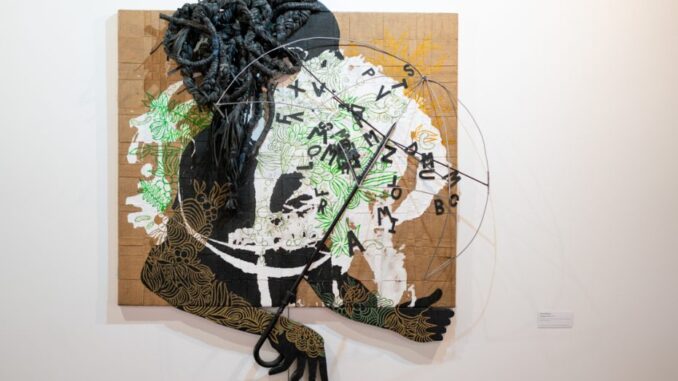
The planet is under stress, marked by chaotic weather events and depleted resources. The situation is dire, but there is hope for a better tomorrow – as long as we have the collective will to achieve it. This is the prevailing narrative driving Patrick Bongoy’s work and his latest exhibition, Ebbing, coming to the historic Spier Wine Farm from 12 February – 12 May 2024.
Like waves repeatedly crashing onto the shore, so are the challenges facing humanity. “It’s the movement, the language of the ocean that gives us a real sense of its power and aliveness,” Bongoy explains. The problems confronting us are real and significant and require urgent action.
“In my understanding as an artist, in my understanding of the world, Earth is a blank canvas that has been given to human beings to imagine and to create – and to make it better for us to live on,” the artist says.
Born in Kinshasa in the Democratic Republic of Congo, Bongoy studied at the Academy of Fine Arts in the city of his birth, before moving to South Africa in 2013. Much of Bongoy’s work focuses on environmental degradation and the resultant effects this has on human movement and access to resources.
“We’ve been given the power to shape this world and protect it,” he says. “But we’ve created a monster. It’s dangerous and we don’t know what to do with it.”
Yet from the depths of despair hope springs. For a start, Bongoy is giving new life to discarded materials. Rubber features prominently in his work, symbolising the direct pollution and destruction that comes from its creation, as well as the social, political and economical issues stemming from it.
“I use the material, translated into whatever I create, as a language of hope and movement,” he says. By making art from waste, Bongoy is finding the balance and harmony in this world he so earnestly seeks – and he hopes those who see his exhibition will have the space to reflect on these ideas.
“I want people to see the beauty and new life that translates out of this dead material,” he explains.
Technically impressive, visually engaging, Bongoy’s art invites the viewer to contemplate forgotten dreams and stolen futures – as with the wall-to-wall canvas of silhouetted children – but also to be emboldened and hopeful.
Bongoy believes there are solutions to these chaotic problems. He feels that the monster we created can be tamed and balance can be restored. Just look, he says, at the people and organisations using recycled plastic to make concrete and furniture. It is but one example, of course, but his own art exemplifies this drive for a better future, for movement and change.
Creating beauty from waste, Bongoy makes something new to be enjoyed by others. It’s this shared responsibility and understanding of the urgency of our planet’s dilemma that motivates the artist. We have the means and the ability to bring about positive change, as long as we work together.
As Bongoy explains: “There are possibilities and solutions. It’s just a matter of effort, energy and consciousness – and the collective will to change.
